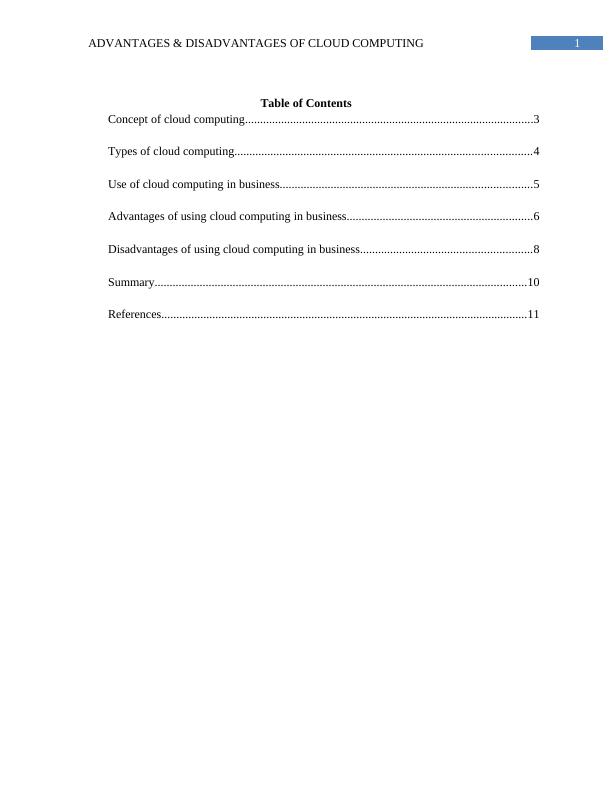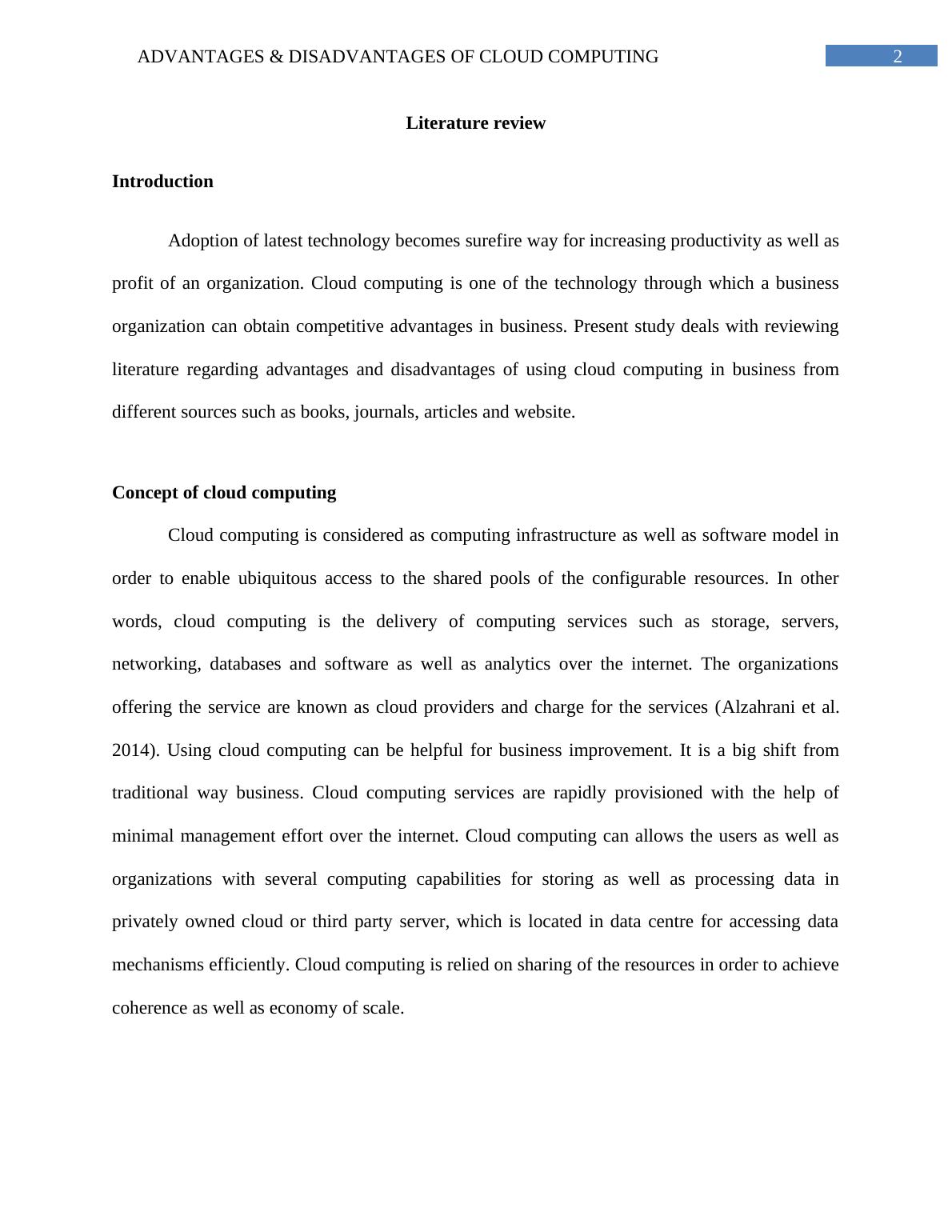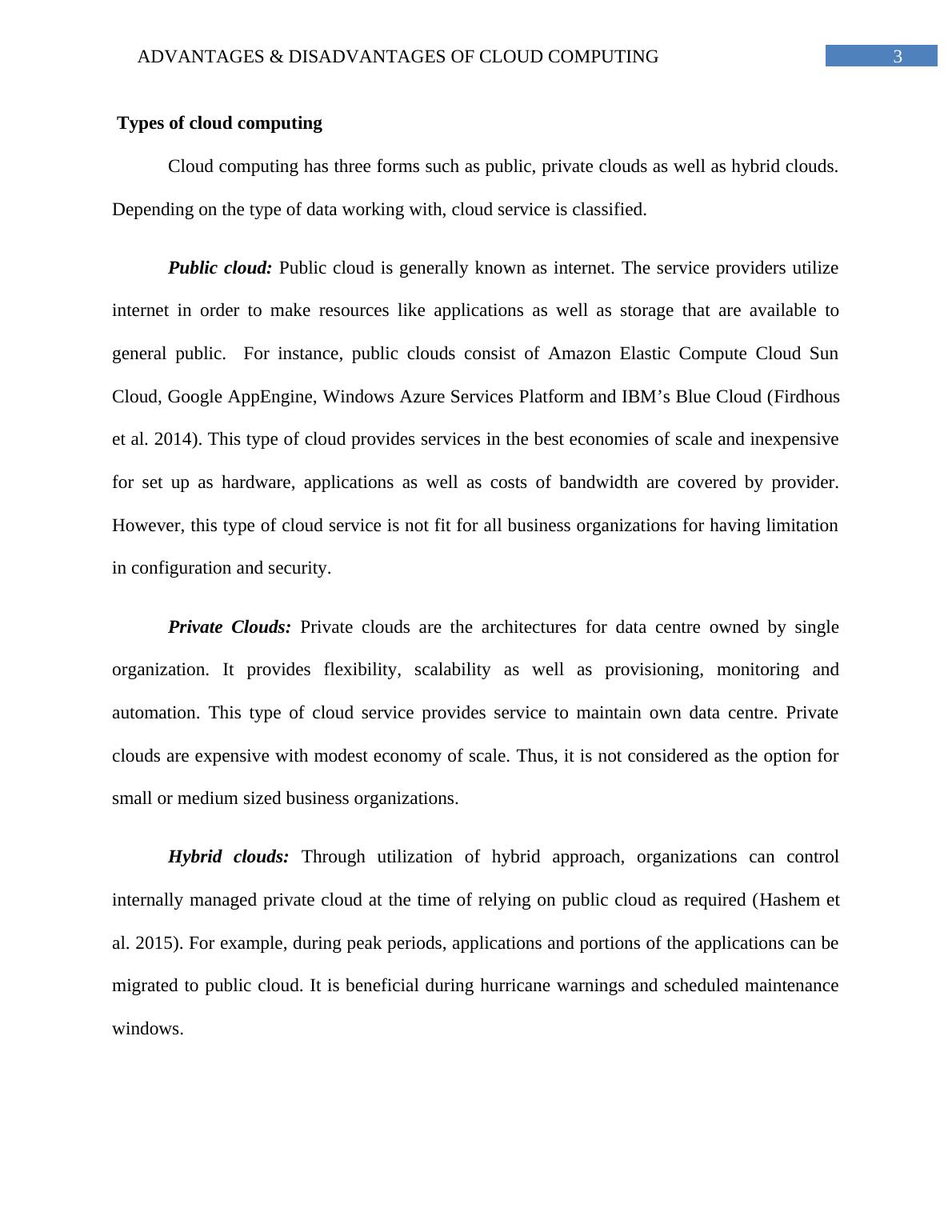ITN 263 - Advantages and Disadvantages of Cloud Computing for Businesses
Added on 2020-03-01
13 Pages3091 Words51 Views
Running head: ADVANTAGES & DISADVANTAGES OF CLOUD COMPUTING
Advantages and Disadvantages of Cloud Computing for Businesses
Part A: Literature review
Name of the Student:
Name of the University:
Author note:
Advantages and Disadvantages of Cloud Computing for Businesses
Part A: Literature review
Name of the Student:
Name of the University:
Author note:

1ADVANTAGES & DISADVANTAGES OF CLOUD COMPUTING
Table of Contents
Concept of cloud computing................................................................................................3
Types of cloud computing...................................................................................................4
Use of cloud computing in business....................................................................................5
Advantages of using cloud computing in business..............................................................6
Disadvantages of using cloud computing in business.........................................................8
Summary............................................................................................................................10
References..........................................................................................................................11
Table of Contents
Concept of cloud computing................................................................................................3
Types of cloud computing...................................................................................................4
Use of cloud computing in business....................................................................................5
Advantages of using cloud computing in business..............................................................6
Disadvantages of using cloud computing in business.........................................................8
Summary............................................................................................................................10
References..........................................................................................................................11

2ADVANTAGES & DISADVANTAGES OF CLOUD COMPUTING
Literature review
Introduction
Adoption of latest technology becomes surefire way for increasing productivity as well as
profit of an organization. Cloud computing is one of the technology through which a business
organization can obtain competitive advantages in business. Present study deals with reviewing
literature regarding advantages and disadvantages of using cloud computing in business from
different sources such as books, journals, articles and website.
Concept of cloud computing
Cloud computing is considered as computing infrastructure as well as software model in
order to enable ubiquitous access to the shared pools of the configurable resources. In other
words, cloud computing is the delivery of computing services such as storage, servers,
networking, databases and software as well as analytics over the internet. The organizations
offering the service are known as cloud providers and charge for the services (Alzahrani et al.
2014). Using cloud computing can be helpful for business improvement. It is a big shift from
traditional way business. Cloud computing services are rapidly provisioned with the help of
minimal management effort over the internet. Cloud computing can allows the users as well as
organizations with several computing capabilities for storing as well as processing data in
privately owned cloud or third party server, which is located in data centre for accessing data
mechanisms efficiently. Cloud computing is relied on sharing of the resources in order to achieve
coherence as well as economy of scale.
Literature review
Introduction
Adoption of latest technology becomes surefire way for increasing productivity as well as
profit of an organization. Cloud computing is one of the technology through which a business
organization can obtain competitive advantages in business. Present study deals with reviewing
literature regarding advantages and disadvantages of using cloud computing in business from
different sources such as books, journals, articles and website.
Concept of cloud computing
Cloud computing is considered as computing infrastructure as well as software model in
order to enable ubiquitous access to the shared pools of the configurable resources. In other
words, cloud computing is the delivery of computing services such as storage, servers,
networking, databases and software as well as analytics over the internet. The organizations
offering the service are known as cloud providers and charge for the services (Alzahrani et al.
2014). Using cloud computing can be helpful for business improvement. It is a big shift from
traditional way business. Cloud computing services are rapidly provisioned with the help of
minimal management effort over the internet. Cloud computing can allows the users as well as
organizations with several computing capabilities for storing as well as processing data in
privately owned cloud or third party server, which is located in data centre for accessing data
mechanisms efficiently. Cloud computing is relied on sharing of the resources in order to achieve
coherence as well as economy of scale.

3ADVANTAGES & DISADVANTAGES OF CLOUD COMPUTING
Types of cloud computing
Cloud computing has three forms such as public, private clouds as well as hybrid clouds.
Depending on the type of data working with, cloud service is classified.
Public cloud: Public cloud is generally known as internet. The service providers utilize
internet in order to make resources like applications as well as storage that are available to
general public. For instance, public clouds consist of Amazon Elastic Compute Cloud Sun
Cloud, Google AppEngine, Windows Azure Services Platform and IBM’s Blue Cloud (Firdhous
et al. 2014). This type of cloud provides services in the best economies of scale and inexpensive
for set up as hardware, applications as well as costs of bandwidth are covered by provider.
However, this type of cloud service is not fit for all business organizations for having limitation
in configuration and security.
Private Clouds: Private clouds are the architectures for data centre owned by single
organization. It provides flexibility, scalability as well as provisioning, monitoring and
automation. This type of cloud service provides service to maintain own data centre. Private
clouds are expensive with modest economy of scale. Thus, it is not considered as the option for
small or medium sized business organizations.
Hybrid clouds: Through utilization of hybrid approach, organizations can control
internally managed private cloud at the time of relying on public cloud as required (Hashem et
al. 2015). For example, during peak periods, applications and portions of the applications can be
migrated to public cloud. It is beneficial during hurricane warnings and scheduled maintenance
windows.
Types of cloud computing
Cloud computing has three forms such as public, private clouds as well as hybrid clouds.
Depending on the type of data working with, cloud service is classified.
Public cloud: Public cloud is generally known as internet. The service providers utilize
internet in order to make resources like applications as well as storage that are available to
general public. For instance, public clouds consist of Amazon Elastic Compute Cloud Sun
Cloud, Google AppEngine, Windows Azure Services Platform and IBM’s Blue Cloud (Firdhous
et al. 2014). This type of cloud provides services in the best economies of scale and inexpensive
for set up as hardware, applications as well as costs of bandwidth are covered by provider.
However, this type of cloud service is not fit for all business organizations for having limitation
in configuration and security.
Private Clouds: Private clouds are the architectures for data centre owned by single
organization. It provides flexibility, scalability as well as provisioning, monitoring and
automation. This type of cloud service provides service to maintain own data centre. Private
clouds are expensive with modest economy of scale. Thus, it is not considered as the option for
small or medium sized business organizations.
Hybrid clouds: Through utilization of hybrid approach, organizations can control
internally managed private cloud at the time of relying on public cloud as required (Hashem et
al. 2015). For example, during peak periods, applications and portions of the applications can be
migrated to public cloud. It is beneficial during hurricane warnings and scheduled maintenance
windows.

End of preview
Want to access all the pages? Upload your documents or become a member.
Related Documents
Management Information Systemslg...
|13
|3545
|477
Literature Review on Cloud Computinglg...
|8
|2328
|36
Cloud Computing: Overview, Strengths, Weaknesses, and Challengeslg...
|8
|2201
|438
(Solution) Integrated Professional Skills in the Digital Agelg...
|8
|1871
|213
Cloud Computing Security PDFlg...
|13
|3038
|39
Security in Cloud Computing and Preventive Methods Assignmentlg...
|14
|3523
|58
